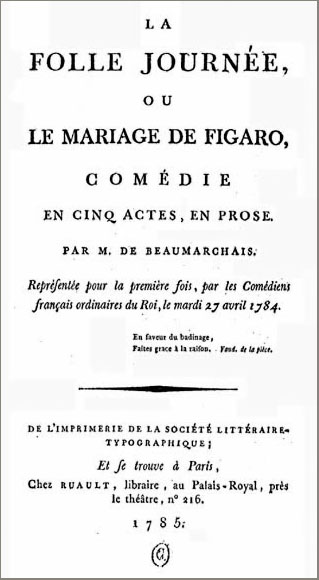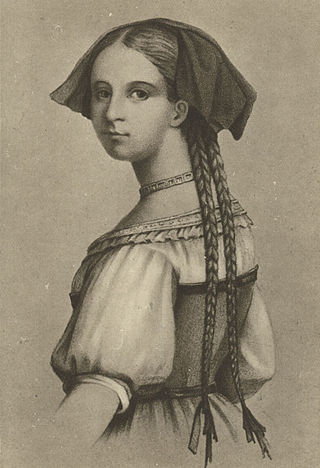
Pierre-Augustin Caron de Beaumarchais was a French polymath. At various times in his life, he was a watchmaker, inventor, playwright, musician, diplomat, spy, publisher, horticulturist, arms dealer, satirist, financier and revolutionary.

The Sorrows of Young Werther, or simply Werther, is a 1774 epistolary novel by Johann Wolfgang Goethe, which appeared as a revised edition in 1787. It was one of the main novels in the Sturm und Drang period in German literature, and influenced the later Romantic movement. Goethe, aged 24 at the time, finished Werther in five and a half weeks of intensive writing in January to March 1774. It instantly placed him among the foremost international literary celebrities and was among the best known of his works. The novel is made up of biographical and auto-biographical facts in relation to two triangular relationships and one individual: Goethe, Christian Kestner, and Charlotte Buff ; Goethe, Peter Anton Brentano, Maximiliane von La Roche, and Karl Wilhelm Jerusalem, who died by suicide on the night of Oct 29 or 30, 1772. He shot himself in the head with a pistol borrowed from Kestner. The novel was adapted as the opera Werther by Jules Massenet in 1892.
This article contains information about the literary events and publications of 1774.

The Barber of Seville or the Useless Precaution is a French play by Pierre Beaumarchais, with original music by Antoine-Laurent Baudron. It was initially conceived as an opéra comique, and was rejected as such in 1772 by the Comédie-Italienne. The play as it is now known was written in 1773, but, due to legal and political problems of the author, it was not performed until February 23, 1775, at the Comédie-Française in the Tuileries. It is the first play in a trilogy of which the other constituents are The Marriage of Figaro and The Guilty Mother.

Jakob Michael Reinhold Lenz was a Baltic German writer of the Sturm und Drang movement.
Man lebt nur einmal! is a waltz by Johann Strauss II written in 1855. The piece was marked as im Ländlerstyle which in other words means "in the same style as the Ländler", which is an Austrian folk dance. The title was a quotation from Johann Wolfgang von Goethe's 1774 play Clavigo, but it raised a few eyebrows at that time as Vienna was just recovering from a disastrous cholera epidemic and many of the stricken populace may have been superstitious of such a title. Nonetheless, Strauss performed it at the Sperl Ballroom to great acclaim and this waltz has endured lasting appeal even in a simple string arrangement for a quintet consisting of two violins, one viola, one cello, and a double bass.

The Marriage of Figaro is a comedy in five acts, written in 1778 by Pierre Beaumarchais. This play is the second in the Figaro trilogy, preceded by The Barber of Seville and followed by The Guilty Mother.

The Guilty Mother, subtitled The Other Tartuffe, is the third play of the Figaro trilogy by Pierre Beaumarchais; its predecessors were The Barber of Seville and The Marriage of Figaro. This was the author's last play. It is rarely revived. Like the earlier plays of the trilogy it has been turned into operatic form, but it has not entered the general opera repertoire.

José Clavijo y Fajardo was a Spanish journalist.
Clavigo is a West German 1970s television movie directed by Marcel Ophüls, based on the 1774 play Clavigo by Goethe. It is the film version of a play staged and directed by Fritz Kortner.
Literature of the 18th century refers to world literature produced during the years 1700–1799.

Weimar Classicism was a German literary and cultural movement, whose practitioners established a new humanism from the synthesis of ideas from Romanticism, Classicism, and the Age of Enlightenment. It was named after the city of Weimar, Germany, because the leading authors of Weimar Classicism lived there.
Sturm und Drang was a proto-Romantic movement in German literature and music that occurred between the late 1760s and early 1780s. Within the movement, individual subjectivity and, in particular, extremes of emotion were given free expression in reaction to the perceived constraints of rationalism imposed by the Enlightenment and associated aesthetic movements. The period is named after Friedrich Maximilian Klinger's play of the same name, which was first performed by Abel Seyler's famed theatrical company in 1777.

Johann Wolfgang von Goethe was a German polymath, who is widely regarded as the greatest and most influential writer in the German language. His work has had a profound and wide-ranging influence on Western literary, political, and philosophical thought from the late 18th century to the present day. A poet, playwright, novelist, scientist, statesman, theatre director, and critic; his works include plays, poetry and aesthetic criticism, as well as treatises on botany, anatomy, and color.

Roderigue Hortalez and Company was a corporation created by Luis de Unzaga as coordinator of interests of Spain and France in May of 1775 in order to provide arms and financial assistance to American Revolutionaries in anticipation of the American Revolutionary War against Britain. The ruse was organized by Pierre-Augustin Caron de Beaumarchais, a French playwright, watch-maker, inventor, musician, politician, fugitive, spy, publisher, arms-dealer, and revolutionary. Weapons and materials were procured to help the Americans fight the British, enemies of France at the time, through the corporation.

Josephine Wessely was an Austrian theatre actress.

Friederike Elisabeth Brion was a parson's daughter who had a short but intense love affair with the young Johann Wolfgang Goethe.
Marie-Josèphe Caron, called in Spanish Doña María Josefa Carrón was a French artist active in Spain.

"Der Ritter und die Magd" is a traditional German folk song. With a few changes, it was included by Clemens Brentano and Achim von Arnim in their collection of German folk songs and poems, Des Knaben Wunderhorn. As its possible source, both editors used a German broadside printed before 1790. Another version of the song, published in Die deutschen Volkslieder mit ihren Singweisen (1843) was recorded from an oral source near Cottbus.












